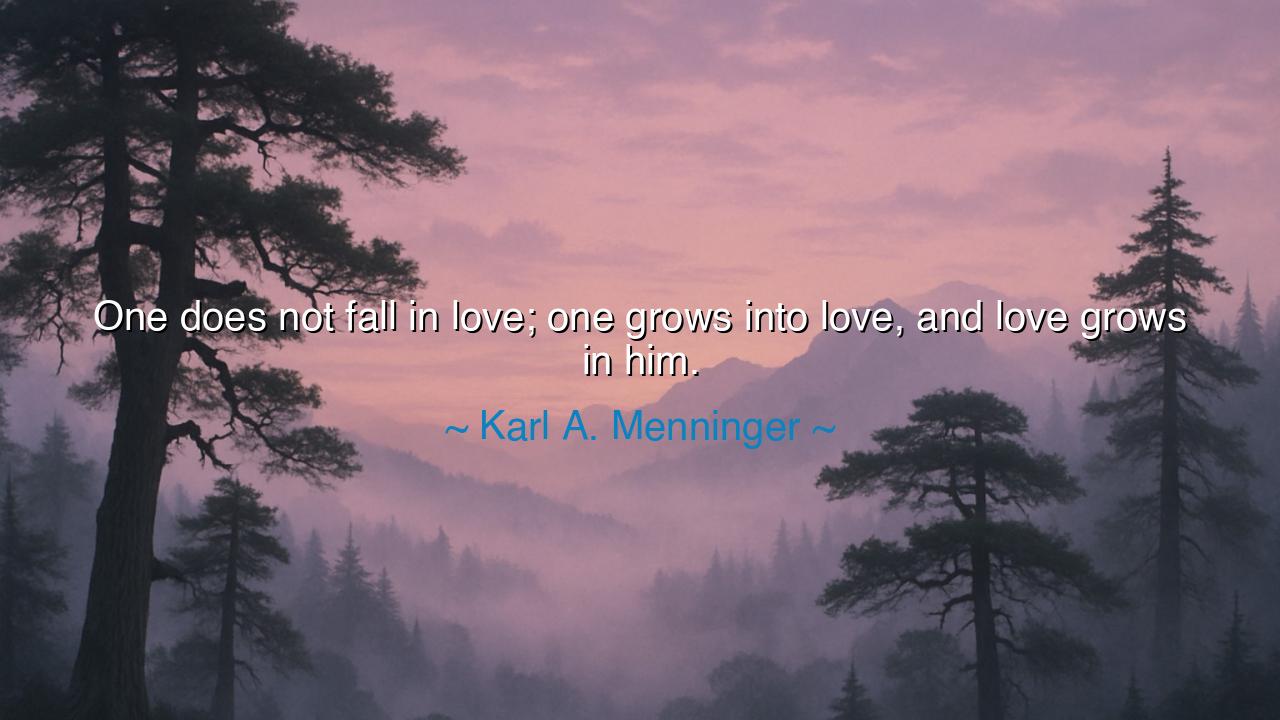
One does not fall in love; one grows into love, and love grows in






“One does not fall in love; one grows into love, and love grows in him.” – Karl A. Menninger
So spoke Karl A. Menninger, the great healer of minds, who understood that the human heart, like the body and the soul, must mature into its fullness. In this luminous thought, he turns aside the notion that love is a sudden fall — an accident of passion or fate — and instead reveals it as a growth, a sacred cultivation. To “fall in love” is to lose balance, to surrender to impulse. But to grow into love is to rise — to deepen, to expand, to transform oneself and the one loved. Menninger, a man of science and compassion, saw that love is not a thunderbolt; it is a garden, and only those who tend it with patience and purpose will taste its true fruit.
When he says, “love grows in him,” he means that love is not merely an emotion directed outward, but a living force that blossoms within the soul. It begins as a seed — fragile, dependent, easily overlooked — and through time, trust, and understanding, it takes root. This is why he rejects the language of falling: love is not a plunge into passion but an ascent into wisdom. Infatuation dazzles, but fades; love endures because it is nurtured. It is not something that happens to us; it is something we become.
The origin of this idea lies deep within Menninger’s calling as a psychiatrist and humanitarian. He saw, in countless lives, that genuine love requires maturity — the ability to understand another person without losing oneself. To love truly, one must possess empathy, patience, and courage. He recognized that many who “fell in love” mistook desire for devotion, intensity for intimacy. They sought completion in another before they had grown whole themselves. Menninger taught that love begins with self-knowledge — that only by growing inwardly can one truly give outwardly. Thus, love is both the root and the blossom of the soul’s evolution.
The ancients, too, knew this truth. Plato spoke of love as a ladder that lifts the soul from the beauty of one person to the beauty of all things divine. To climb this ladder is not to fall, but to rise — step by step, from passion to understanding, from desire to virtue. In this sense, love is the path of growth: it transforms the lover into something greater than he was before. The heart expands to contain another, and through that expansion, becomes vast enough to embrace the world. Menninger’s insight echoes this eternal teaching — that love is both a discipline and a destiny.
Consider the life of Mahatma Gandhi and his devotion to humanity. His love was not born of sentiment or infatuation, but of a lifelong growth in compassion. It began with the simple desire to defend the dignity of others, and through struggle and suffering, it grew into a force that liberated nations. He did not “fall” into this love; he grew into it, and it grew in him until his entire being radiated peace. Such love is not bound by romance or family; it is the flowering of the soul that has learned to see all life as kin.
Menninger’s wisdom also reminds us that love, like all growth, requires effort. The seed must be watered with attention, shielded from resentment, pruned of pride. Love grows in us only when we choose to forgive, to listen, to stay when it would be easier to leave. It demands that we outgrow selfishness and learn tenderness. As a tree bends toward the light, so must the heart bend toward understanding. In this way, love becomes not a possession but a way of being — steady, strong, and alive.
So, my listener, if you would know love, do not seek to fall; seek to grow. Plant its seed with humility. Nurture it with patience. Let it teach you to see beyond yourself. For true love does not strike like lightning — it dawns like the sun, slowly, beautifully, illuminating everything it touches. And when love has fully grown in you, you will find that it no longer depends on chance or desire; it has become your nature. In that moment, you will understand Menninger’s truth — that the greatest love is not the one we stumble into, but the one we cultivate until it fills us, roots and all.






AAdministratorAdministrator
Welcome, honored guests. Please leave a comment, we will respond soon